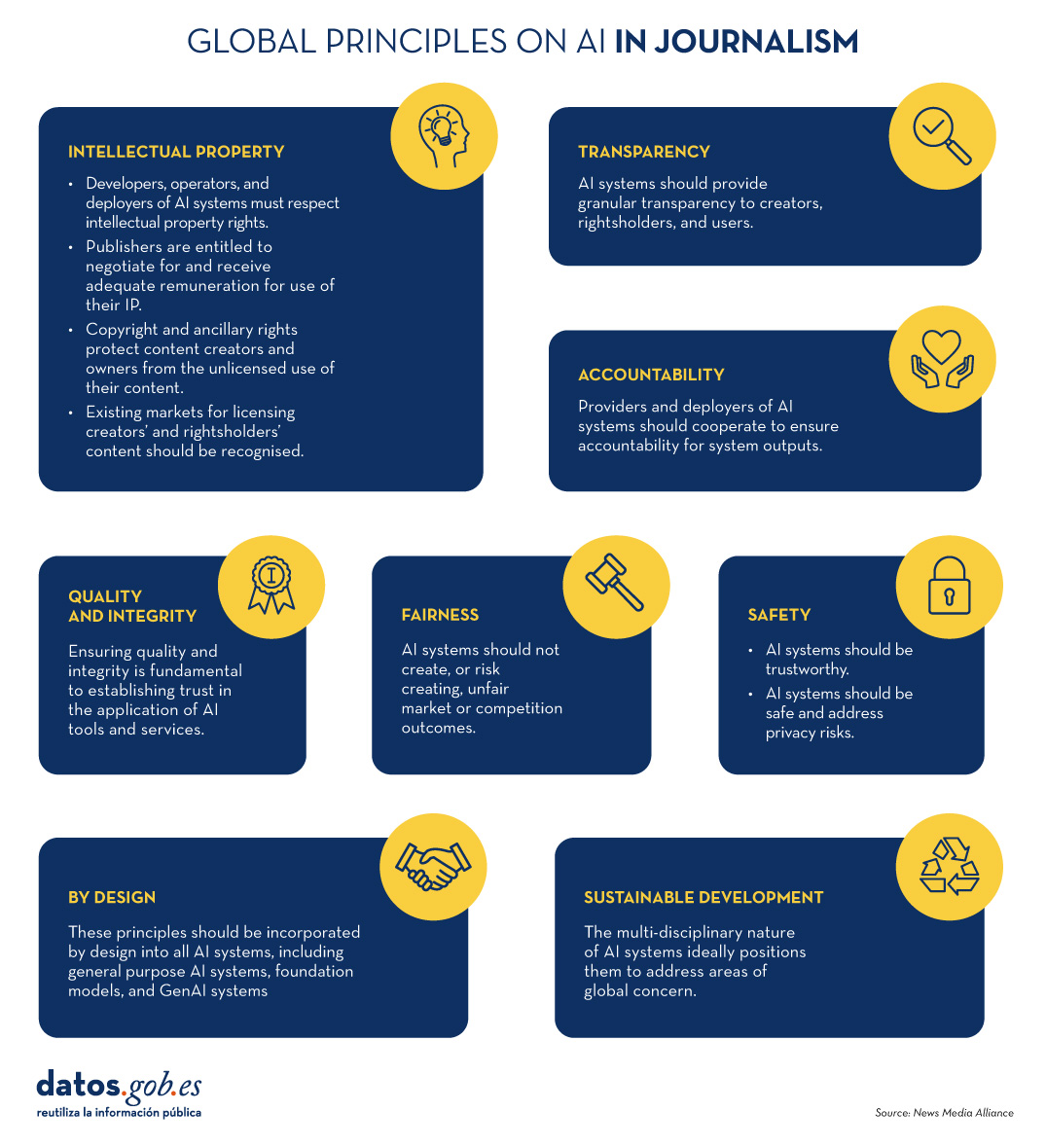
General ethical frameworks
The absence of a common, unified, ethical framework for the use of artificial intelligence in the world is only apparent and, in a sense, a myth. There are a multitude of supranational charters, manuals and sets of standards that set out principles of ethical use, although some of them have had to be updated with the emergence of new tools and uses. The OECD guide on ethical standards for the use of artificial intelligence, published in 2019 but updated in 2024, includes value-based principles as well as recommendations for policymakers. The UNESCO Global Observatory on Ethics and Governance of AI published in 2021 a material called Recommendation on the Ethics of AI adopted in the same year by 193 countries, and based on four basic principles: human rights, social justice, diversity and inclusiveness, and respect for the environmental ecosystem. Also in 2021, the WHO specifically included a document on Ethics and Governance of AI for Health in which they indicated the need to establish responsibilities for organisations in the use of AI when it affects patients and healthcare workers. However, various entities and sectors at different levels have taken the initiative to establish their own ethical standards and guidelines, more appropriate to their context. For example, in February 2024, the Ministry of Culture in Spain developed a good practice guide to establish, among other guidelines, that works created exclusively with generative AI would not be eligible for awards.
Therefore, the challenge is not the absence of global ethical guidelines, but the excessive globality of these frameworks. With the legitimate aim of ensuring that they stand the test of time, are valid for the specific situation of any country in the world and remain operational in the face of new disruptions, these general standards end up resorting to familiar concepts, such as those we can read in this other ethical guide from the World Economic Forum: explainability, transparency, reliability, robustness, privacy, security. Concepts that are too high, predictable, and almost always look at AI from the point of view of the developer and not the user.
Media manifestos
Along these lines, the major media groups have invested their efforts in developing specific ethical principles for the use of AI in the creation and dissemination of content, which for now constitutes a significant gap in the major frameworks and even in the European Regulation itself. These efforts have sometimes materialised individually, in the form of a manifesto, but also at a higher level as a collective. Among the most relevant manifestos are the one by Le Figaro, which editorial staff states that it will not publish any articles or visual content generated with AI, or that of The Guardian which, updated in 2023, states that AI is a common tool in newsrooms, but only to assist in ensuring the quality of their work. For their part, the Spanish media have not issued their own manifestos, but they have supported different collective initiatives. The Prisa Group, for example, appears in the list of organisations that subscribe to the Manifesto for Responsible and Sustainable AI, published by Forética in 2024. Also interesting are the statements of the heads of innovation and digital strategy at El País, El Español, El Mundo and RTVE that we found in an interview published on Fleet Street in April 2023. When asked whether there are any specific red lines in their media on the use of AI, they all stated that they are open-minded in their exploration and have not limited their use too much. Only RTVE, is not in the same position with a statement: "We understand that it is something complementary and to help us. Anything a journalist does, we don't want an AI to do. It has to be under our control.
Global principles of journalism
In the publishing context, therefore, we find a panorama of multiple regulations on three possible levels: manifestos specific to each medium, collective initiatives of the sector and adherence to general codes of ethics at national level. Against this backdrop, by the end of 2023 the News Media Alliance published the Global Principles for AI in Journalism, a document signed by international editorial groups that includes, in the form of a decalogue, 12 fundamental ethical principles divided into 8 blocks:

Figure 1. Global principles of AI in journalism, News Media Alliance.
When we review them in depth, we find in them some of the major conflicts that are shaping the development of modern artificial intelligence, connections with the European AI Regulation and claims that are constant on the part of content creators:
- Block 1: Intellectual property. It is the first and most comprehensive block, specifically developed in four complementary ethical principles. Although it seems the most obvious principle, it is aimed at focusing on one of the main conflicts of modern AI: the indiscriminate use of content published on the internet (text, image, video, music) to train learning models without consulting or remunerating the authors. The first ethical principle expresses the duty of AI system developers to respect restrictions or limitations imposed by copyright holders on access to and use of content. The second expresses the ability of these authors and publishing groups to negotiate fair remuneration for the use of their intellectual property. Third, it legitimises copyright as a sufficient basis in law to protect an author's content. The fourth calls for recognising and respecting existing markets for licensing, i.e. creating efficient contracts, agreements and market models so that AI systems can be trained with quality, but legitimate, authorised and licensed content.
- Block 2: Transparency. The second block is a logical continuation of the previous one, and advocates transparency in operation, a feature that brings value to both content authors and users of AI systems. This principle coincides with the central obligation that the European Regulation places on generative AI systems: they must be transparent from the outset and declare what content they have trained on, what procedures they have used to acquire it and to what extent they comply with the authors' intellectual property rights. This transparency is essential for creators and publishing groups to be able to enforce their rights, and it is further established that this principle must be universally adhered to, regardless of the jurisdiction in which the training or testing takes place.
- Block 3: Accountability. This word refers to the ability to be accountable for an action. The principle states that developers and operators of AI systems should be held accountable for the outputs generated by their systems, for example if they attribute content to authors that is not real, or if they contribute to misinformation or undermine trust in science or democratic values.
- Block 4: Quality and integrity. The basis of the principle is that AI-generated content must be accurate, correct and complete, and must not distort the original works. However, this superficial idea builds on a more ambitious one: that publishing and media groups should be guarantors of this quality and integrity, and thus official suppliers to AI system developers and providers. The fundamental argument is that the quality of the training content will define the quality of the outcomes of the system.
- Block 5: Fairness. The word fairness can also be translated as equity or impartiality. The principle states in its headline that the use of AI should not create market unfairness, anti-competitive practices or unfair competition, meaning that it should not be allowed to be used to promote abuses of dominance or to exclude rivals from the market. This principle is not aimed at regulating competition between AI developers, but between AI developers and content providers: AI-generated text, music or images should never compete on equal terms with author-generated content.
- Block 6: Safety. It is composed of two ethical principles. Building on the above, the first security principle states that generative AI systems must be reliable in terms of the information sources they use and promote, which must not alter or misrepresent the content, preserving its original integrity. The opposite could result in a weakening of the public's trust in original works, in authors and even in major media groups. This principle applies to a large extent to new AI-assisted search engines, such as the new Google Search (SGE), the new SearchGPT or Microsoft's own Copilot, which collect and recast information from different sources into a single generated paragraph. The second point unifies user data privacy issues into a single principle and, in just one sentence, refers to discriminatory bias. Developers must be able to explain how, when and for what purpose they use user data, and must ensure that systems do not produce, multiply or chronic biases that discriminate against individuals or groups.
- Block 7: By design. This is an overarching meta-principle, which states that all principles should be incorporated by design in all AI systems, generative or otherwise. Historically, ethics has been considered at the end of the development process, as a secondary or minor issue, so the principle argues that ethics should be a significant and fundamental concern from the very process of system design. Nor can ethical auditing be relegated only to cases where users file a complaint.
- Block 8: Sustainable development. It is apparently a global, far-reaching principle that AI systems should be aligned with human values and operate in accordance with global laws, in order to benefit all of humanity and future generations. However, in the last sentence we find the real orientation of the principle, a connection to publishing groups as data providers for AI systems: "Long-term funding and other incentives for providers of high-quality input data can help align systems with societal goals and extract the most relevant, up-to-date and actionable knowledge
The document is signed by 31 associations of publishing groups from countries such as Denmark, Korea, Canada, Colombia, Portugal, Brazil, Argentina, Japan or Sweden, by associations at European level, such as the European Publishers Council or News Media Europe, and associations at global level such as WAN-IFRA (World Association of News Publishers). The Spanish groups include the Asociación de Medios de Información (AMI) and the Asociación de Revistas (ARI).
Ethics as an instrument
The global principles of journalism promoted by the News Media Alliance are particularly precise in proposing grounded solutions to ethical dilemmas that are very representative of the current situation, such as the use of authored content for the commercial exploitation of AI systems. They are useful in trying to establish a solid and, above all, unified and global ethical framework that proposes consensual solutions. At the same time, other conflicts affecting the profession, which would also be included in this Decalogue, are conspicuously absent from the document. It is possible that the omnipresence of the constantly referenced data licensing conflict has overshadowed other concerns such as the new speed of disinformation, the ability of investigative journalism to verify authentic content, or the impact of fake news and deepfakes on democratic processes. The principles have focused on setting out the obligations that the big tech companies should have regarding the use of content, but perhaps an extension could be expected to address ethical responsibilities from the media's point of view, such as what ethical model the integration of AI into newsroom activity should be based on, and what the responsibility of journalists is in this new scenario. Finally, the document reveals a common duality: the channelling, through the ethical proposal, of the suggestion of concrete solutions that even point to possible trade and market agreements. It is a clear reflection of the potential capacity of ethics to be much more than a moral framework, and to become a multidimensional instrument to guide decision-making and influence the creation of public policy.
Content prepared by Carmen Torrijos, expert in AI applied to language and communication. The contents and points of view reflected in this publication are the sole responsibility of the author.


